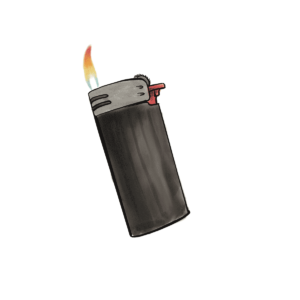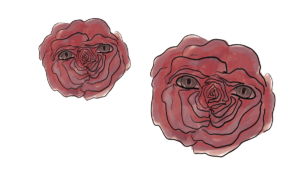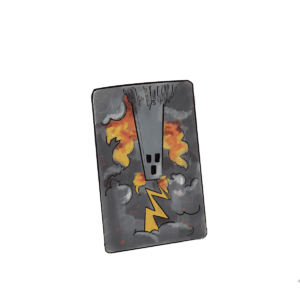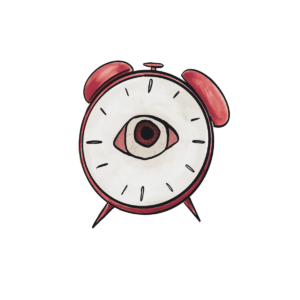In your life you’ve felt many sizes. When you were young, you looked at the adults around you, at the older kids you envied, and felt small in the world. But you grew. Sometimes, now, you feel so big you think you’ll never be small again. Then something shows you how big you really were all along. You stare into the hugeness of it until you can’t see yourself, like a scale model of the earth beside a star. In Bára Hladik’s experimental debut novella New Infinity, the Czech-Canadian author grapples with her experiences of autoimmune disease, contextualizing the small pains and pleasures of the self within a vast and often vicious universe. The novella deals with themes of perspective and subjective experience — rendering hurt and joy in transcendent, almost spiritual terms, and painting life and illness in all the shades of wonder and horror that make up both.

The novella is structured as a series of short stories interspersed with three poetic sections. As a rule, the stories tend to be grounded more firmly in the physical world and are where Hladik’s writing is at its most poignant. Poeticism in prose is a difficult line to walk, and runs the risk of stifling a story with verbosity, but Hladik’s strength lies in simplicity. Her narrators are dry, straightforward, and often grimly ironic, delivering cuts like, “the clock was moving, we weren’t” that serve to mock the farcical bureaucracy of, say, a hospital that asks you if you’re pregnant when you come in, aching and in pain, to request a sick note.
When I spoke to Hladik in an interview, she told me this interplay between the constrictive language of medicine and the infinite world of personal experience was a major focus for her. “Part of the process… was taking this medical language that had been attributed to my own experience and my body [and creating] a sensation of some sort of transformation… even if the medical language is so finite.” She spoke about one piece in particular, “ank-kih-low-sing spon-dill-eye-tiss,” which is a “juxtaposition between found material from medical files [to get] a doctor’s perspective on an ankylosing spondylitis patient, and… a narrative collected from forums of people who live with [the disease].” In illuminating the differing realities inhabited by those who live with autoimmune disease and those who treat it, Hladik gives the reader a human perspective on an issue that is all too often clinicalized in language.
The straightforwardness of Hladik’s language in her prose by no means stops her from crafting compelling metaphors and scenarios that paint pictures vivid enough for readers with no experience of long term illness to enter the subjective worlds of her characters. In one early story, “Speed Bump”, she describes the chronic pain that writhes within her character as snakes. They “flex and roll and bite,” only subsiding in the bath, when she can be “among the whales.” This alone is excellent use of visceral imagery, skillfully conveying a specific and intimate experience in deeply relatable terms. The animal motif continues as the protagonist longs to return to the peaceful drifting of the whales, and contemplates the secret snakes that must lurk within so many others that she sees on the street.

There are moments like this throughout New Infinity where the author creates a strong sense of community among people all over the world and throughout history who live and have lived with disease and disability. This recognition of and identification with the struggles of others goes a long way in developing the novella’s themes of perspective being the only true exit from one’s bodily and mental experiences. The strongest example of this in New Infinity is the short poem “midnight hydrangea”, where Hladik transforms the millions of individual people sharing similar struggles into a beautifully mystical family of “young and old, watching through walls… [and] craving the moon”. This is, as I see it, one of the most powerful abilities of storytelling. All too often, I find myself walking without feeling the ground, riding the bus without looking at the people around me. Days melt together until life seems unwritten, unguided. Good fiction pulls your eyes back, shows you patterns in the things you’ve seen before. “Midnight hydrangea” and other poems like it give a new shine to the worn and the dull.
Hladik also manages to avoid this tunnel vision when it comes to the subject matter of her novella. While autoimmune disease colors every chapter in some form or another, just as it colors every part of one’s life, the enormity of it does not dominate the author’s portrayal of the day to day. Instead, forces like love, heartbreak, time, and poverty dance and swirl around the unifying theme of illness, intermingling with it skillfully and realistically, even when things take a turn for the symbolic. “The Break Up”, for example, sees the narrator’s apartment begin to fall apart after they receive a positive diagnosis for Celiac disease. They can’t afford to repair anything, and their relationship with their partner, too, is on its last legs, crushed under the burden of food and wealth insecurity. It’s clear that the narrator still cares for their partner, but when you share your life with someone, you have to share the pain of poverty and illness along with the joy of love. It’s a heavy load to bear, and wonderfully expresses the complex intersection of social and medical troubles that can strain any relationship until it groans under the weight.

Another highlight of the novella (and one of Hladik’s personal favorites, she told me), is “The Sound of Your Cry”, a story bound up in the universal feelings of intense loneliness and desire for connection told through the lens of illness. The protagonist describes hearing the routines of their next door neighbor through the walls. In the mind of the narrator, their neighbor becomes a mother, and the soft noises of her movements provide comfort and support. They “listen to her chop carrots… [and] dream of her leaning low to [their] ear singing”. The neighbor soon meets a man and moves out of her apartment, leaving the narrator with only the memory of her music, muffled by walls. The premise of a stranger’s simple existence becoming such a strong source of comfort and encouragement is deeply moving, and Hladik’s treatment of the one-sided relationship with the protagonist’s “mother” is heart wrenchingly tender. The narrator’s desire to prove to her neighbor “that [she] is not falling apart” reflects back again on the theme of perspective, illuminating the fundamentally human desire to be witnessed through another’s eyes.
While the prose-heavy sections of New Infinity excel without fail, the novella’s poetry sections, “Book of Shadows,” “Book of Mirrors,” and “Book of Dreams” represent hiccups in its otherwise smooth pacing. That isn’t to say that these sections don’t add to the text as a whole. They certainly do, and highlights like “lost” and “wind of mirrors” handily justify their place by providing a stylized view on the central issues of the novella, which prose simply can’t. Much of the directness and focus that characterizes the prose sections is abandoned here, however, leading to a more meandering style that can drag in certain places. I do concede that, as someone with no personal experience living with autoimmune disease, I lack much of the context that could serve to elevate these expressive pieces. As it stands, however, I find they lack the impact of Hladik’s more grounded narratives.

Speaking to Hladik, I came to truly appreciate the level of determination a long form piece like New Infinity demands from any author, especially when one is fighting an entirely separate battle simultaneously. I asked her if she had any words of wisdom to writers in general, and to those managing external factors while they write in particular. “Do it your way,” she said. “And do it for yourself. Just keep archiving and collecting and eventually it will grow.” On that note, we ended our talk with some advice that I myself can personally vouch for: “Eat good meals!”
New Infinity can be a challenging read. Its experimental structure and mixture of prose with poetry may push the boundaries of comfort for some readers, and the novella’s content and themes could certainly prove difficult for some to internalize. But this challenge is, as with many things, an essential aspect of the experience. With a confident hand, Hladik guides the reader into the dark clouds of life in a world that seems against you, and proves that clouds are small things, really. And the stars behind are infinite.


